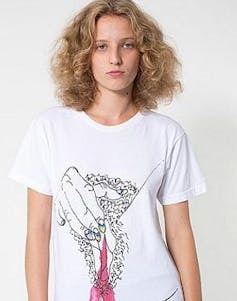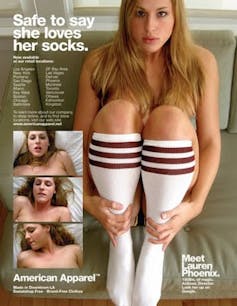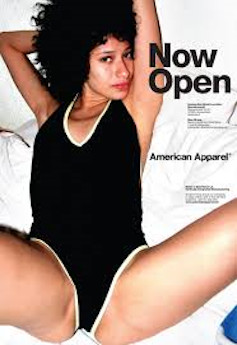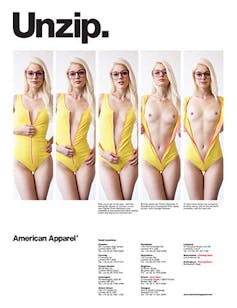
The last time I wore anything with a motif on it was my bile-inducing bottle-green school jumper; complete with a crest involving a javelin.
Since then I’ve despised clothes with “stuff” on it. From the Rodney Rude “ho ho fucking ho” T-shirt my aunty wore one Christmas, to the branded, the political and the thoroughly unfunny gag-Ts, I’ve never understood the appeal.
Taste however, is subjective and highly shoddy grounds to protest.
So American Apparel are getting the attention that every retailer salivates for, this time by peddling a T-shirt with a genitalia sketch. Complete with a stream of blood, pubic hair and fingers positioned to suggest a little diddlin’.

No, I wouldn’t wear it, but is there any kind of problem here? Does the top deserve the “most provocative T-shirt of all time” tag?
Making this issue both interesting and complex is that American Apparel have, alas, not a modicum of feminist credentials. This isn’t a case of the National Organization of Women selling “This is What a Feminist Looks Like” T-shirts, rather, it’s a company who have made “splayed-legged women in lycra” their trademark.
I won’t claim American Apparel ads are bad for women - that topic needs its own article and, for this post, I’ll just point you towards my book on sex in advertising - but, in brief, the company is very accustomed to accusations that they use very young girls in very provocative ways. Their reputation when it comes to The Ladies is - akin to Tony Abbott’s - beleaguered.
On one hand, the Period T is certainly capable of being construed as refreshing. In a world where we glorify corporations by paying to wear logo-ed apparel, it seems almost triumphant that menstruation could be elevated to the same level of esteem.
Ahh, but here’s the gimmick. Because none of this is about women’s empowerment.

I could mount a feminist defence of American Apparel ads, equally I could write a condemnation. What I’m much more interested in spotlighting is the thorough delusion of thinking that politics underpins any of this.
American Apparel wants to sell stuff. That’s it. Getting other people - getting news media - to talk about you is marketing gold.
So here’s American Apparel with their T-shirt that is less feminist and more gimmick. Is it offensive? Should it be - God forbid - banned?

Does a T-shirt, for example, constitute a billboard? Does it make those who pass you on the street captive to your message? Are your rights to wear what you want trouncing the rights of the conservatives sharing your footpath?
Does a sketch of lady parts constitute the same kind of offensiveness as an emblazoning of “FCUK”? Or as an image of a woman smoking? Or anything involving the word princess?
I’m conflicted. That anyone would think it appropriate to dictate what people wear in public sounds all very French and revolting.

And yet, the T-shirt does provide a good excuse to talk about public space and our rights within.
As a feminist, as a menstruator, as a masturbator and as someone with pubic hair, of course, there’s nothing on that T-shirt that worries me. I’m not buying one, no, but hey, it’s no Rodney-Rude-corruption-of-Christmas monstrosity.
And yet, while I might not mind it, I live in a culture where advertisements for feminine hygiene products still use blue liquid because red conjures squeamishness. I live in a culture where supermarkets can’t sell vibrators because autoeroticism apparently leads to conniptions.
Apparently not everyone shares my values. And as much as I might not like it, the narrow-minded have rights too. Rights to offence and rights to complain.
On this occasion I don’t think we need bother acting of course, but it’s a conversation topic I do enjoy nevertheless.
My new book - American Taboo: The Forbidden Words, Unspoken Rules, and Secret Morality of Popular Culture - is launching in Melbourne on November 12, 2013. Professor Rob Brooks and Joy FM’s Dean Beck will be saying entertaining things. Bring friends!
